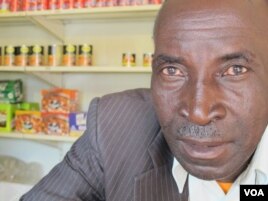08 June, 2014
Informal business sectors make up a large part of South Africa's economy. These stores and services are important for job creation in a country with an unemployment rate of at least 25 percent. But immigrant-owned and foreign retail companies are increasing their share of the South African market. As Mario Ritter tells us, that has hurt local traders who operate informal businesses called "spazas."
John Stheole has owned his spaza for more than 10 years. It is a small, gray building in Dube village, in the Soweto area of the capital Johannesburg. His small store offers many kinds of goods -- from soap to sweets.
Spaza means "just getting by." The shops are found in non-white communities where larger, more-official stores are not available, or are too costly.
There are about 100,000 spazas in South Africa. They employ 290,000 people. But few have paid attention to the part these stores can play in creating jobs.

John Stheole has owned his spaza shop for more than a ten years in Dube Village, Soweto, South Africa. (Photo Gillian Parker for VOA)
Research shows that what is called the "informal sector" in Africa is very large. Informal workers can be self-employed or wage-earners. Last year, the African Development Bank said the informal sector provides about 55 percent of the economic productivity of African countries south of the Sahara Desert.
But business has been slow for Mr. Stheole. He is competing with a nearby store run by a family from Pakistan.
"I must say, I am struggling..."
South Africa is the only country in the area where refugees and asylum-seekers can move freely, and have the right to work. South Africa is the only hope of living and working in peace for people who have fled countries like Somalia and Zimbabwe.
But reduced profits for native traders, and high unemployment rates, have caused tensions in the country. Immigrants are accused of taking jobs from South Africans. Some also believe immigrants hurt South African shopkeepers by selling goods at lower prices. In September, more than 100 Somali-owned spazas were attacked during four days of unrest in the city of Port Elizabeth.
I'm Mario Ritter.